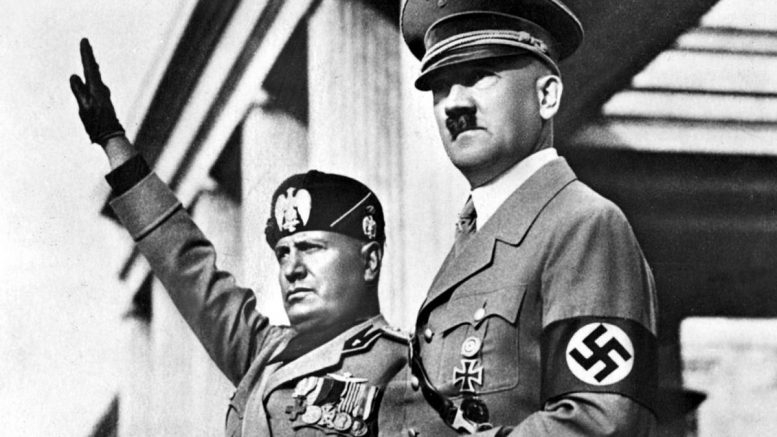Throughout campaigning for the 2019 European Parliamentary elections, a protest movement against Farage’s Brexit Party got underway. Protest groups on the left started throwing milkshake to try to humiliate and protest against Brexit supporters. Farage himself was “milkshaked”, as was an elderly veteran working as a teller at a polling station in Aldershot. Some praised the actions as “acceptable” as they were “against fascists”. Writers for the online magazine Vice started encouraging the practice, writing articles such as: “How to Make the Perfect Milkshake for Throwing at Fascists”.

Such events however, did not stop the Brexit Party from sweeping to victory in the European elections. However after their victory they were once again accused of being fascist, with Plaid Cymru leader Lianne Wood posting a picture on her Facebook page depicting Brexit voters as Nazis.
During Trump’s state visit to the UK in early June 2019 the “milkshaking” continued, with Trump supporters being assaulted by protesters and having slogans like “Nazi scum” and “fascist” hurled at them. The Mayor of London, Sadiq Khan, wrote an article published in The Observer accusing Trump, Farage and other right wing European politicians of using tropes similar to “20th Century fascists”.
To genuinely believe any of these accusations is to completely misunderstand what fascism actually is.
Fascism as an ideology is difficult to define. But since its inception in Italy during World War I, fascist regimes have been hallmarked by key themes which have remained fairly consistent. Generally, these can be summed up as:
- Dictatorial power – The structure of a typical fascist regime features a dictatorial figure, who enjoys unchallenged rule without any sort of check on power. Democratic norms are normally abandoned, with opposition parties being banned, elected parliamentarians having no ability to hold the leader to account, as well as political opponents being imprisoned.
Example: The 1933 Enabling Act passed by Germany’s Adolf Hitler allowed him to bypass the Parliament completely. By the November 1933 election, opposition parties in Germany were banned, and the NSDAP party won all the seats unopposed.
- Violence and intimidation – Fascists tend to gain power through terror tactics. Violent protests, marches, the forcible suppression and intimidation of opposition, the rounding up and beating of political opponents on the street, as well as the vandalism and destruction of opponents’ property all feature heavily in fascism. This is normally done by establishing a form of secret police. The fear of being “informed” to the secret police as an opponent of the regime is also part of the tactics of fear.
Example: Portugal’s Estado Novo regime featured a secret police which used to jail and intimidate opponents, although it is debatable whether Salazar’s regime was actually fascist. The most famous example is Benito Mussolini and his armed forces marching on Rome in October 1922, planning a violent insurrection. They were able to seize power without armed conflict. Hitler also used terror tactics to coerce a frightened population into voting for him.
- Ultranationalism – Fascists tend to believe in the type of ultranationalism which demands racial purity in a belief that they themselves are racially superior. To achieve this, mass deportations or even ethnic cleansing are held as policy aims. This ultranationalism also makes fascist regimes tend to favour territorial expansion to enhance the power of the state.
Example: Hitler’s Nazi regime famously believed that German Aryans were the “Master race”, and set out to exterminate those who they believed to be inferior. They also sought territorial expansion to enhance the German state and provide living space (“lebensraum”) for their citizens.
- Regimentation of industry – This normally involves key industries being brought into the control of the state, to enable direct intervention in the economy. Fascism often contains heavy elements of corporatism, and nationalisation plays a key role to increase the power of the state. Fascist regimes are also often an autarky – an economic system where self-sufficiency is prized and the nation can survive without international trade or external assistance.
Example: Spain’s regime headed by Franco and the fascist Falange party featured heavy elements of corporatism. The free market was abandoned, and corporations set prices and wages with the state acting as a mediator. The government would often deliberately intervene in the economy at the behest of the corporations.

It is clear that Trump, Farage, nor any of the European leaders on the right of the current political spectrum bear any relation to the aforementioned political positions. To associate 17.4 million voters with the fascist ideology is also clearly absurd.
For political commentators on the left however, it is far easier to slur your opponents as “fascists”, than actually counter their points with thoughtful, well constructed argument. It is incredibly disrespectful to politicians on the right of the political spectrum, as well as the victims of fascism themselves, to throw around the word “fascist” without fully understanding the ideology. And it is ironically the hardline Remainers, with their ambition to ignore the result of the democratic verdict given in the 2016 EU referendum, who are starting to show some of the hallmarks of fascism that they claim to rail against.
This post was originally published by the author on his personal blog: https://joelrwrites.wordpress.com/2019/06/25/no-trump-and-farage-are-not-fascists/
 Daily Globe British Values, Global Perspective
Daily Globe British Values, Global Perspective




Well said. Another term being used by the BBC for people who desire Brexit is “Extremist”. This sort of muck throwing brings the whole of politics into disrepute.